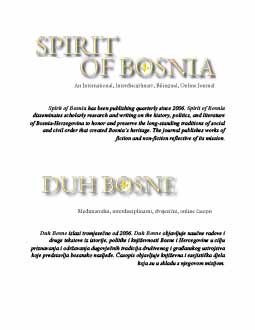
We kindly inform you that, as long as the subject affiliation of our 300.000+ articles is in progress, you might get unsufficient or no results on your third level or second level search. In this case, please broaden your search criteria.


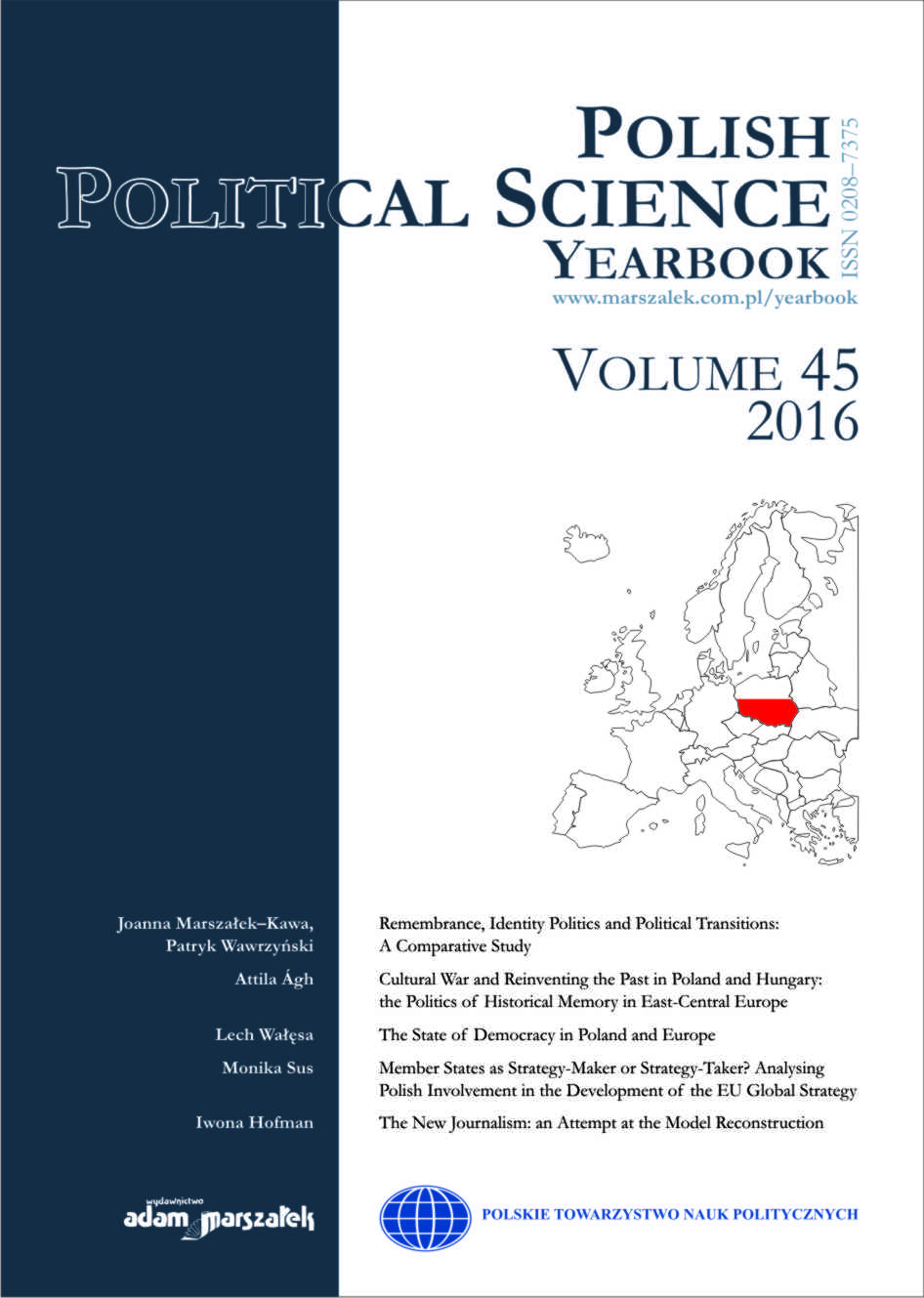
The exclusive interview with Mr Lech Wałęsa, the legendary leader of “Solidarity” Trade Union, the Noble Peace Prize Laureate in 1983 and the President of Poland from 1990 to 1995, on the state of democracy in Poland and Europe presents Mr Wałęsa’s perspective on challenges that contemporary political leaders have to face. It discusses four major areas: a historical consideration of Poland’s post–communist transformation, a today’s perspective on democracy in Poland, an evaluation of country’s role in the united Europe and a discussion of processes that threat democracy in Poland and Europe. In the interview, Mr Wałęsa shares his hopes and fears, and he presents main ideas for the new political times. His assessments do not focus only on the today’s state of democracy, but he also tries to consider how the democracy may look like in the future. As a result the Polish Political Science Yearbook publishes a unique conversation with the legend of the struggle against Communist dictatorships in Europe that shows Mr Wałęsa’s personal remarks on the democracy, the globalised World and modern technologies.
More...
The article investigates the features of implementation of the civil rules of international treaties in the sphere of copyright in the legislation of the Russian Federation. It is concluded that the above implementation has a proactive nature. The influence of the provisions of international treaties on the development of national legal systems is considered. The main trends in the development of the legal regulation of relations in the field of intellectual property usage are analyzed.
More...
The problem of adequacy of epistemological forms of perception of the category of norm of law to its actual content is urgent in the context of the current situation with the uncertain content of some legal phenomena. The epistemological nature and logical certainty of the category of regulatory prescription are considered. In order to reveal correlation between the categories of norm of law and regulatory prescription, it is suggested that the latter should be treated as an expression of the comprehensive content of norms of law. The norm of law, as an epistemological tool and the result of scientific knowledge within the legal institutional framework, is an integrated form of textual expression of the content of articles of laws and other normative legal acts. The norm of law is not a rule of conduct, thereby being rather the rule in general, i.e., having the universal nature, which is expressed as an authoritative order. It defines the socially meaningful model of prospects and dues in the regulation of social relations, as well as the legal status of their participants for the purpose of smooth development of the society and state.
More...
Legal science lacks any systematic knowledge on the methodology used by researching and practicing lawyers. The paper considers such knowledge as an ideal reference point for lawyers, who have to constantly improve their qualifications, such as to develop their own professional methodology. The conclusion is made that the methodology allows to update the existing knowledge on the object of study and helps the lawyer to become a leading innovator in science and practice.
More...
The paper analyzes civil legal ways to protect the violated intellectual property rights of both property and non-property character and their jurisdiction. The main features of protection of the rights to know-how and problems arising from their procedural protection are considered.
More...
The paper reveals the legal nature and priority of agreement between the parties as the basis of change or termination of the contract. The possibility of mutually agreed change and termination of the contract by the parties is analyzed based on implementation of the principle of freedom of contract. The subject of the study is also the sources of centralized and decentralized regulation of the restrictions on freedom of modification and termination of the contract. Inconsistency of the legislation in this sphere (particularly, between the provisions of articles 450 and 450.1 of the Civil Code of the Russian Federation) is revealed. Special attention is paid to the possibility of change and termination of the contract by agreement of the majority of its participants. Therefore, convergence of the legal regimes of such individual legal acts as transaction and assembly decisions is emphasized. Practical issues associated with interpretation of the restriction to change and terminate the contract by mutual agreement of the majority of its participants are considered.
More...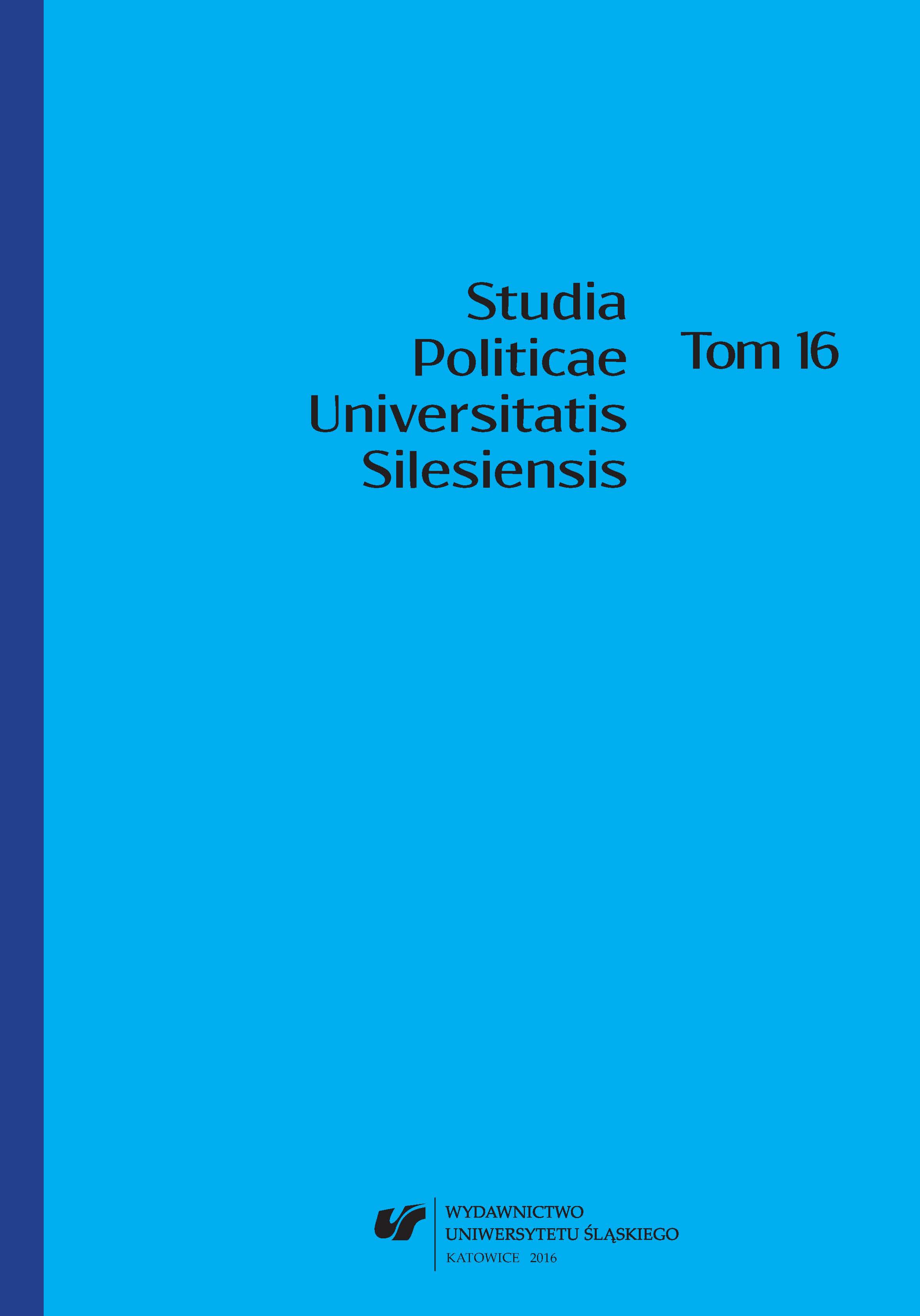
Smuggling drugs from Latin American countries, with the participation of European citizens is a complex and multi‑faceted phenomenon. There is a variety of its manifestations and scale, as well as the variety of profiles and stories of people smugglers who are involved in the smuggling process. Unfortunately, among them there are also Poles although the trend, compared with the initial years of the first decade of the twenty‑first century, is decreasing. In media there are shown some information about the smuggling, but only periodically there are some news about smuggling attempts undertaken by organized criminal groups. Too rarely informed about the people running, whether on behalf of drug gangs, whether on their own responsibility, and about the specifics of conditions in Latin American prisons, radically different from European penitentiary systems.
More...
Contemporary tendencies in the development of human rights are the result of historical events and documents that regulate attitude towards human rights in the context of given civilization circles and historical turning points. In the twentieth century, characterized by numerous paradoxes, the idea of human rights has taken root firmly through international charters, agreements, conventions and other documents. But, in the same time, massive violations of basic human rights have taken place, among them right to life, freedom, security and right to righteous trial, as elementary indicators for the development of democracy in a certain society. The development of the idea of proclaiming and protection of human rights as a historical process has, at the international level, the consequence of building a s–stem of universal rules, which gained the character of international standards of human rights. International standards of human rights are numerous, contained in various instruments and are developed permanently. The very goal of the author’s elaboration in the present work is to delineate the historical path and content of the right to challenge legality of custody, involved in the most important international documents accepted after the World War Two.
More...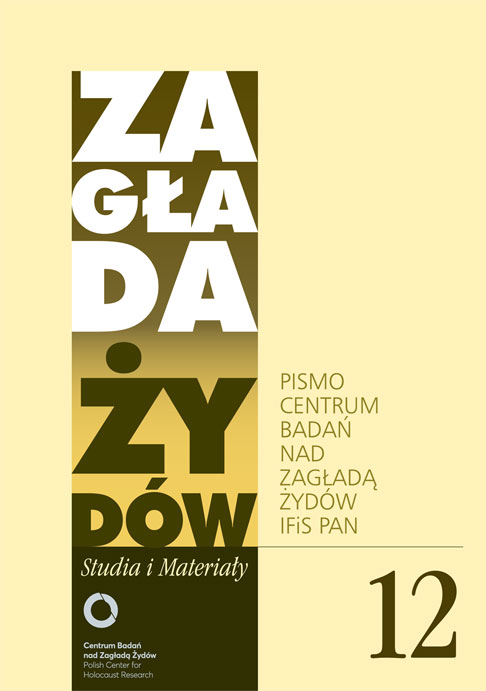
Pod koniec 2015 r. niemiecką prasę obiegła wiadomość, że z początkiem następnego roku przed sądami w Detmold, Hanau, Neubrandenburgu i Kilonii mają się rozpocząć cztery nowe procesy „oświęcimskie”. Przed niemieckimi sądami miało stanąć trzech mężczyzn i jedna kobieta, oskarżonych o współudział w zbrodniach dokonywanych w nazistowskim obozie zagłady Auschwitz. Do chwili obecnej zakończyło się tylko jedno postępowanie sądowe w Detmold. Byłego strażnika obozu zagłady w Auschwitz Reinholda Hanninga oskarżono o współudział w mordzie 170 tys. osób i skazano na karę pięciu lat pozbawienia wolności.
More...
W lipcu 2015 r. zakończył się w Lüneburgu proces przeciwko 94-letniemu Oskarowi Gröningowi, byłemu strażnikowi KL Auschwitz, winnemu pomocnictwa w zamordowaniu 300 tys. węgierskich Żydów. Rok później, w czerwcu 2016 r., Sąd Krajowy w Detmold uznał równolatka Gröninga i jak on niegdyś członka załogi SS-Totenkopf-Sturmbann Auschwitz Reinholda Hanninga za winnego pomocnictwa w zgładzeniu co najmniej 170 tys. osób w tej samej Ungarn--Aktion. Były to prawdopodobnie jedne z ostatnich w RFN procesów przeciwko sprawcom zbrodni hitlerowskich.
More...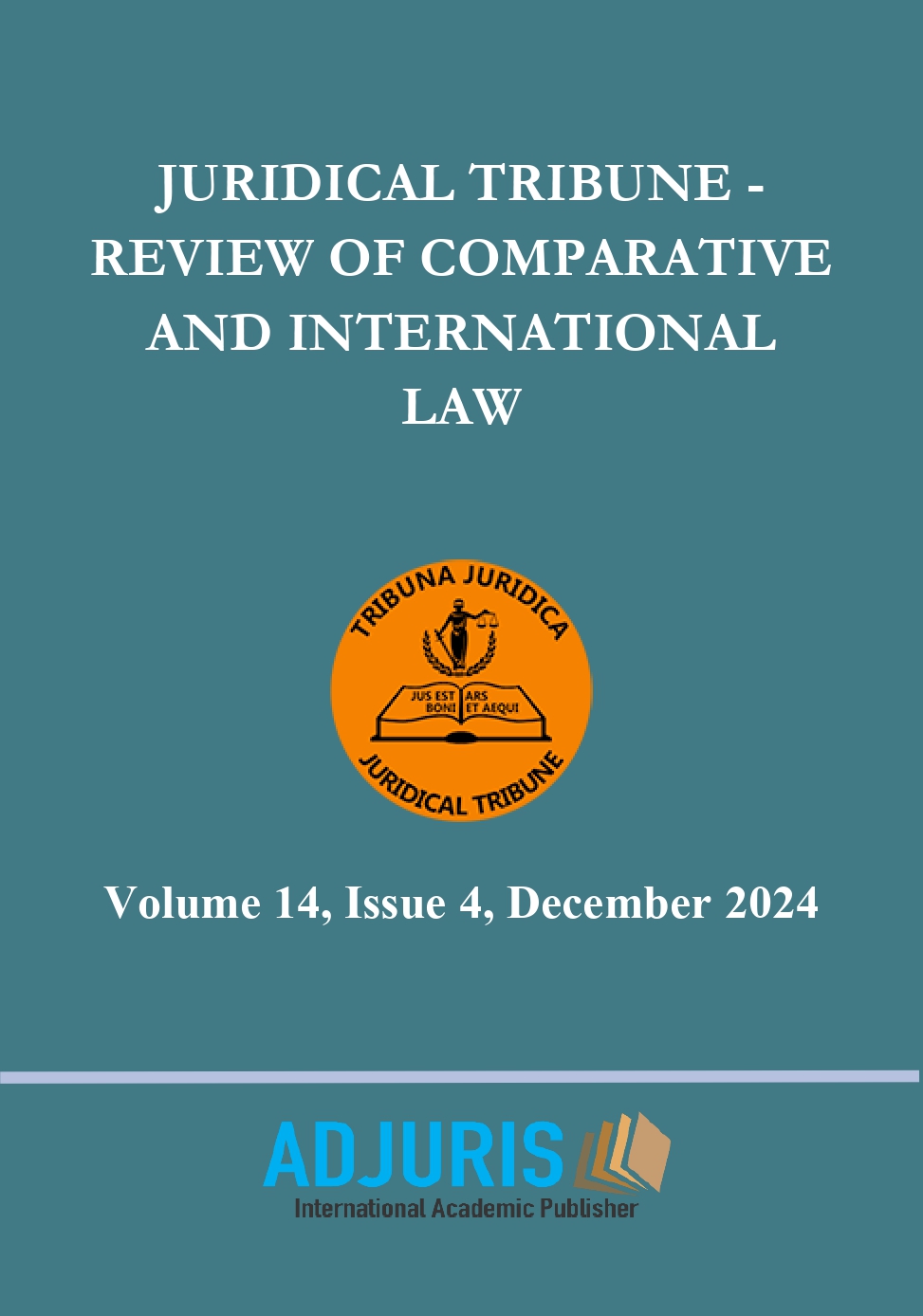
Indonesia, in collaboration with the UNDP, issued a sovereign blue bond in May 2023, valued at JPY 20.7 billion, to support the UN Sustainable Development Goals (SDGs). This bond, launched on the Japanese capital market, aims to promote sustainable marine ecosystems and the blue economy. This study investigates the need for blue bond regulation in Indonesia, advocating for the enforcement of international commitments and agreements. Using normativeexploratory legal research with statutory and conceptual approaches, the study employs the legal convergence theory. The findings highlight the urgent need to regulate blue bonds in Indonesia and suggest that international treaties on blue bonds can be integrated into Indonesian law without conflicting with the 1945 Constitution. The study recommends the prompt preparation and ratification of a blue bond law through the harmonization of the relevant international agreements. The agreement related to blue bonds in the Indonesian legal system needs to be aligned with national laws and regulations, following the principles and requirements outlined in relevant international agreements. Alternatively, blue bonds issued by international organizations in Indonesia should ensure not only compliance with international standards, but also contribute to national sustainable development, taking into account international law and national interests.
More...
The report presents brief biographical notes of the famous Bulgarian jurist and public figure. In terms of structure and content, it represents a kind of conversation with Prof. K. Katsarov. Current questions were asked about the state of the judiciary in the country, of legal science, as well as those related to his personal impressions and assessments of the events of the 20th century. It was on them that Prof. Katsarov reflected in his scientific works, and his views on these questions are presented as answers with a topical sound to this day.
More...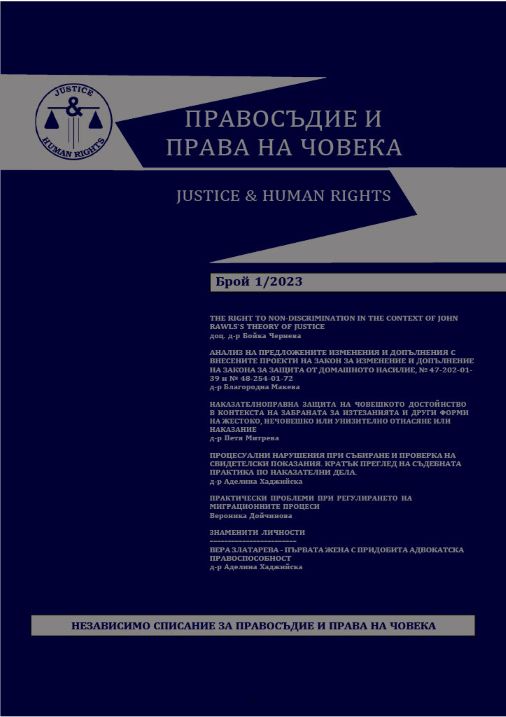
The actuality of the topic of migration in the Republic of Bulgaria and Europe apearsfrom the fact that as a result of the mass departure of groups of people from Middle East andNorth Africa and their unregulated entry into European countries, the migration processesacquired a wide public response and occupied the main place among the priority tasks ofnational and international politics. The significance and scale of the problem requires theinstitutions in each affected country to work intensively in the direction of limiting andregulating the new manifestation of modern migration and presents them with the seriouschallenge of taking adequate and effective measures to control it. Due to its geographicallocation, the Republic of Bulgaria found itself in the zone of migration pressure, which theexternal borders of the European Union have been subjected to for several years. As it is partof the East-Mediterranean route of illegal migration, our country is a transit point for migrantscoming from Turkey to countries such as France, Germany, and Great Britain. As the externalborder of Europe, Bulgaria should fulfill its commitments, observe their correct and accurateimplementation, make efforts for enhanced border protection and impose sanctions forviolations of the border regime. In this regard, the present research aims to answer severalquestions regarding where the regulation of migration movements is located in the Bulgarianlegislation, whether there is a need for legislative changes with a view to improving the legalregulation of migration processes and what they should be.
More...
The essay begins from the consideration of Restorative Justice according to some of its salient aspects: participation, reparation and transformation, and then focuses on their characteristics emerging from two recent volumes, "La giustizia accogliente" by Grazia Mannozzi and Roberto Mancini and "L'etica del riparare" by Paolo Bettineschi. The aim is to put the two volumes in dialogue in order to bring out not only the importance of the three elements mentioned, to the point of considering them "essential", but also what the relationships between them might be and whether a possible balance needs to be identified and maintained.
More...
The justice system in the Republic of Moldova reflects both similarities and notable differences from that in Romania, influenced by the geographical and cultural proximity. The Moldovan judicial system has gone through multiple crises and reforms in recent decades: the post-Soviet transition, accusations of politicization and corruption, major scandals such as the “Robbery of the Century” and attempts to align it with European standards. In recent years, accelerated reforms, such as code amendments and vetting procedures, have aimed to increase the efficiency and transparency of the system, but especially the integrity of judges and prosecutors. However, challenges remain: the length of court proceedings, low case resolution rates and the political influence on the justice system. Recent progress, supported by European pressures, points to a positive direction, with initiatives on digitalization, continuous training of judges and the fight against corruption. These efforts are essential for strengthening the rule of law and public trust in the judiciary.
More...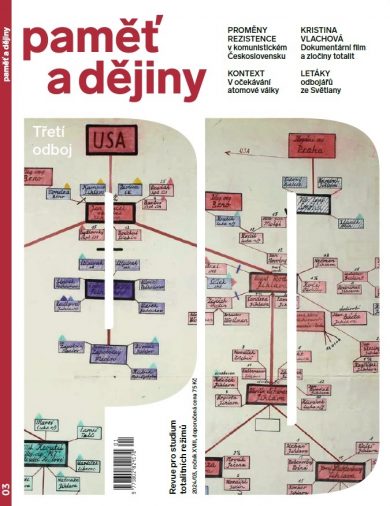
Kristina Vlachová: Confronting Totalitarian Crimes Through Documentary Filmmaking Kristina Vlachová, a well-known documentary filmmaker, has made it her life's work to expose and face the atrocities of totalitarian governments in Czechoslovakia. Her path started with a rocky childhood shaped by the shame linked to her last name Slánská, and the harsh communist rule. Even though she faced many hurdles, like being pushed out of different jobs because of her political views, Vlachová kept going in her search for the truth. She said no to signing the Anticharta worked in kids' publishing, and later became a caretaker. After 1989, she created many powerful documentaries such as "Jáchymovská stigmata" and "Bez milosti," which shed light on the brutal acts of the communist regime. Her work has gained her a lot of praise, both at home and abroad, and she remains a key figure in recording the country's past.
More...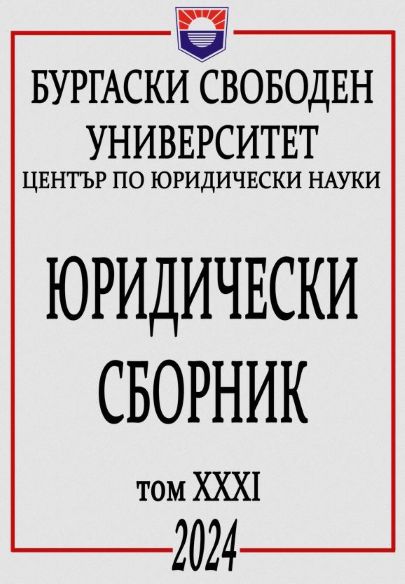
It is customary for parties to international commercial arbitration cases to be represented by one or more representatives of parties registered with several bar associations or not registered with a bar association at all, or even by a layperson where permitted. In addition, the seat of arbitration may often be where neither party's representative is licensed. This raises the question of which ethical rules will be applicable to the parties' representatives, who will be the competent authority in the event of a violation, whether arbitral tribunals have legitimate authority to sanction the parties' representatives, etc.
More...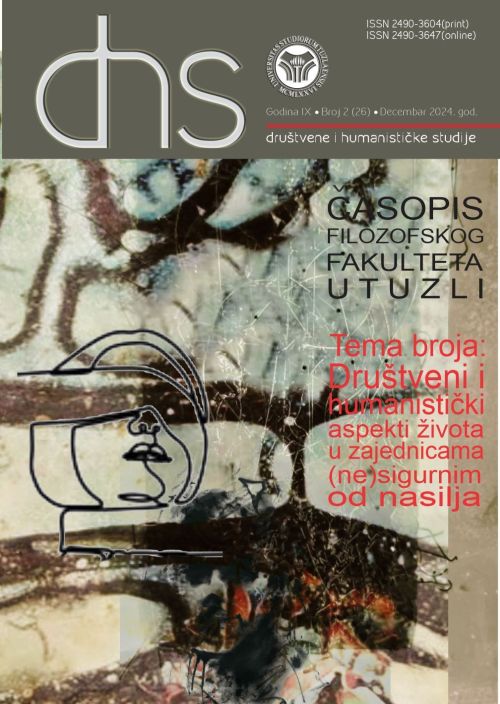
The aim of this article is to critically examine the transitional justice process of reconciliation in post-war Vukovar, focusing on symbolic violence and sites of memory. Compared to the international publications, those published by the author of this paper are critically reviewed as an exercise in self-reflexivity and moral responsibility for the knowledge produced about the war victims of Vukovar in 1991. The concluding remarks, therefore, offer new insights into the relational dynamics of symbolic violence and newly created sites of memory in post-war Vukovar. Moreover, this modest attempt to decipher the tangible impacts of the reconciliation framework of transitional justice in Vukovar has confirmed the inability of socially constructed politics to manage symbolic violence and sites of memory after a bloody war.
More...